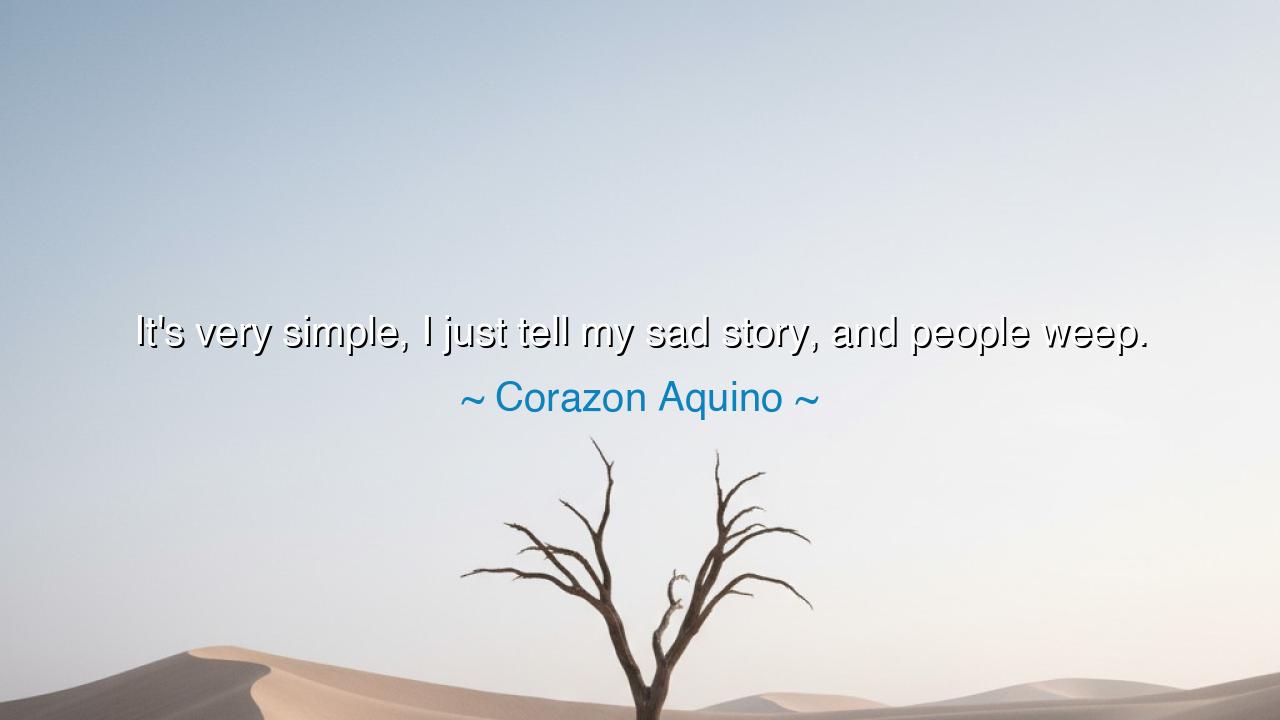
It's very simple, I just tell my sad story, and people weep.






When Corazon Aquino said, “It’s very simple, I just tell my sad story, and people weep,” she revealed a truth as old as civilization itself—that there is no power greater than the truth of human suffering spoken with sincerity. She, a woman who rose from the quiet life of a housewife to become the first female President of the Philippines, did not seek power through violence or wealth. Instead, she wielded her pain like a lantern, illuminating the hearts of her people. Her words remind us that when truth is born from tears and courage, it does not need ornament or persuasion—it moves mountains on its own.
To tell one’s sad story is not a plea for pity, but an act of courage. It is to strip away the armor of pride and reveal the wounds of the soul so that others may see themselves reflected in it. Corazon Aquino’s story was indeed sad: the assassination of her husband, Benigno “Ninoy” Aquino Jr., under a tyrannical regime; the years of grief and fear that followed; and yet, out of that sorrow, she became the voice of her people’s hope. The simplicity she spoke of was not in her words, but in her heart’s purity—her suffering was genuine, and thus it resonated with the nation’s collective pain. When she wept, the Philippines wept with her.
Throughout the ages, the power of sorrow has stirred revolutions and rebirths. Think of Joan of Arc, a peasant girl who heard divine voices and led armies not with the sword but with the flame of faith. When she spoke of her visions and her suffering, hardened soldiers bowed their heads, for they felt the truth in her tears. Or think of Mahatma Gandhi, whose frail body and quiet voice carried the weight of an empire’s conscience. He too told a “sad story”—of oppression, hunger, and injustice—and through his pain, millions found their strength. The sorrow of such souls does not destroy; it transforms.
In Corazon Aquino’s words lies the secret of true leadership: that power rooted in empathy outlasts all empires built on fear. A ruler may command armies, but a grieving heart commands nations. Her “sad story” was not meant to elicit despair—it was a bridge. Through it, she united the wounded hearts of her people and turned tears into action. Thus, when people wept, they did not weep only for her—they wept for themselves, for the years lost to silence, and for the hope that, perhaps, pain could finally give birth to peace.
There is also in this quote a lesson about the alchemy of emotion. Pain, when unspoken, festers; but when shared with honesty, it becomes a balm. The ancients knew this truth well. The tragedians of Greece—Aeschylus, Sophocles, Euripides—taught that suffering is the crucible through which wisdom is born. “Even in our sleep,” wrote Aeschylus, “pain which cannot forget falls drop by drop upon the heart.” And so, when Corazon Aquino spoke her grief, she did not weaken herself—she purified her spirit and gave her people the strength to remember, to feel, to rise.
The meaning of her words, then, extends far beyond politics. It touches every human being who has ever been broken, silenced, or dismissed. We each carry a sad story within us, but it is not meant to be buried. To tell it truthfully is to release its burden and to awaken compassion in others. The world does not need more perfection; it needs authenticity. The tear that falls honestly is more powerful than the sword raised in deceit.
So let her lesson be a guide: when the heart aches, do not hide its tremor. Speak your truth—not to gain sympathy, but to kindle connection. Your wounds, when shared with courage, may become someone else’s healing. And when you meet another soul’s sorrow, do not turn away; let their tears remind you of your own humanity. For in this exchange of truth, sorrow becomes sacred, and we remember what it means to be truly alive.
Thus, the legacy of Corazon Aquino’s simple, sad story lives on—not as a tale of tragedy, but as proof that the strength of a single tear, shed in honesty, can move a nation toward freedom, compassion, and light.






AAdministratorAdministrator
Welcome, honored guests. Please leave a comment, we will respond soon